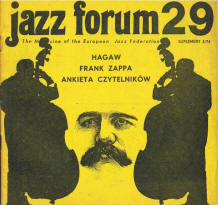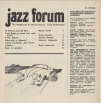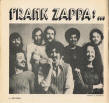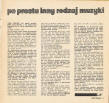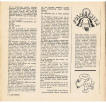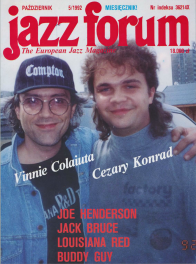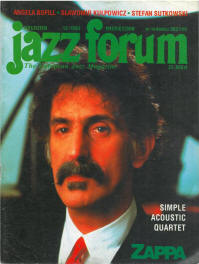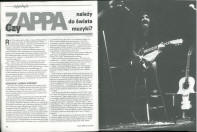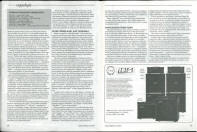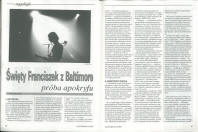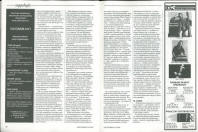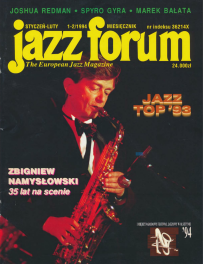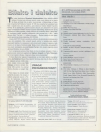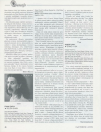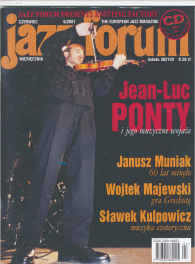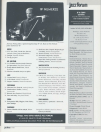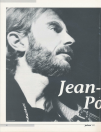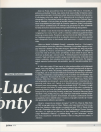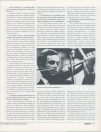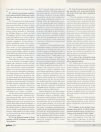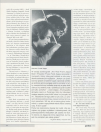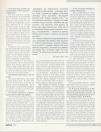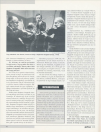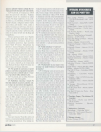Jazz Forum
1974 September
Issue 29
Frank Zappa: po prostu inny rodzaj muzyki (Frank
Zappa: just another kind of music)
By Marek Garzdecki, pp 6-8
Automatic translation:
[ ... ] So I went to L.A. and for the first four months I played
around different clubs: jazz and fusion. I played with the Fowler
brothers, who used to be in Frank Zappa's group Mothers of Invention.
It so happened that Frank was looking for a new rhythm section.
I went for an audition and stayed in his band for two and a
half years.
JF: What kind of music did you play with Zappa?
VC: A very difficult one. It was a mixture of everything. It
was comedy music. We would play, for example, some rock'n'roll
number, then bebop, for the next few minutes someone would tell
some jokes, then we would play heavy metal, reggae and suddenly
in the middle of some rock song we would completely unexpectedly
perform a composition that sounded like Edgar Varèse
or something like that. It was a piece written exactly in notes,
with the strangest polyrhythmic divisions. That's not all -
it happened that we played two concerts every night, and each
show lasted at least two and a half hours not counting encores.
So, we're talking about performances that lasted five or six
hours, and on top of that there was at least an hour-long soundcheck.
Not only that - every day we traveled from place to place. That
requires a tremendous amount of effort.
JF: Did you also record albums?
VC: At one point Frank took a portable studio with a two-track
tape recorder with him on tour and recorded every concert. He
now keeps those tapes at home and releases new records every
so often.
I recorded "Joe's Garage," which was originally supposed to
be a single, but ended up as a double album. I participated
in the recording of several other albums, but I completely forget
how many. [ ... ]
Source: www.polishjazzarch.com
1993 December
Issue 150
Czy Zappa należy do świata muzyki? (Do
Zappa belongs to the world of music?)
By Bogdan Chmura, pp 28-31
Święty Franciszek z Baltimore (St Francis
of Baltimore)
By Andrzej Dorobek, pp 32-35
The Best Band You Never Heard In Your Life
(review)
By Adam Szule, p 45
Automatic translation:
[ ... ] He [Dick
Bock] was ahead of his time. We are now talking about "world
music," and this was the 1960s! He wanted to push me into new
territory, and I wasn't ready for that. At that time I was still
at the stage of bebop and Coltrane. But Bock showed me a lot
of pop records from that period - the Doors, the Fifth Dimension.
He wanted me to record an album outside the jazz mainstream.
Until finally he mentioned Zappa's name. And he said: "Oh, that
would be interesting!". Zappa was not a jazz musician, but I
knew he was experimenting with instrumental music. He was not
interested in commercial music. I agreed. Bock called Zappa
and we arranged a meeting. The meeting took place at his house
at 1 a.m. at night. It was a real hippie secna - there were
his children running around the house naked. Dick took with
him a tape of me and George Duke recording from a club in Los
Angeles. Zappa listened to it and says: "Why did you want to
see me? What do you want? These guys are too good for me. They
play fantastic!". And Dick Bock said: "I have an idea for you
to be the producer of Jean-Luc's album." "O.K." - Frank agreed.
Two weeks later he already had all the music written. These
were compositions that he had not used before. That's how the
album "King Kong" was created - my solo album with his music.
It was played by Ernie Watts on saxophone, George Duke and a
couple of musicians from Zappa. Everything went perfectly, but
I was still living in France. I spent a few months in California
and returned home. The album was made in 1969.
Four years later, I played in his band The Mothers of Invention
for over six months. He wanted an instrumental band with good
jazz musicians - that was his idea. But Frank Zappa was a slave
to his own image. He started to lose his audience - and so he
had to go back to rock and roll. After a while, I didn't feel
like I belonged in that band.
JF: But you still had the opportunity to improvise....
JLP: Less and less. In the beginning - yes. There was a lot
of rhythmic music. His band was something like a classical orchestra.
To tell you the truth, Zappa wanted to become a composer of
classical music - that was his dream, which he realized later.
JF: However, knowing him intimately you can say that he was
a kind of genius?
JLP: But of course. Absolutely! But at the end of his life he
hated jazz and jazz musicians. He couldn't stand the whole scene.
He hated it when me and George Duke started improvising. Me
and George had a similar musical background, we grew up on jazz
and classical music. When I started a solo, all the musicians
followed me, as if it were my band - a jazz band. And Zappa
couldn't play, couldn't follow me. But after all, he was the
star! He simply could not improvise on harmonic functions.
It's funny, there are, for example, such musicians as Allan
Holdsworth. He doesn't know a single note either! He plays only
by ear, but the way he plays is incredible - like Coltrane on
the guitar! So there are different kinds of talents and intelligence
in music. Zappa's genius manifested itself more in his compositions.
We began to feel a little strange, as if it was no longer his
band but ours - mine and Duke's. Zappa began to cut our solos,
until finally I was performing two small solos and playing in
the background for the rest of the time. And I started to like
it less and less.
JF: You did manage to record a few albums with him, though.
JLP: When we toured, Zappa recorded every concert. He released
several records. But I don't even know how many there are, but
I have them at home. I remember one - "Overnite Sensation,"
which we recorded in a studio in Los Angeles. But I know that
after I left, several more were released. [ ... ]
Source: www.polishjazzarch.com
